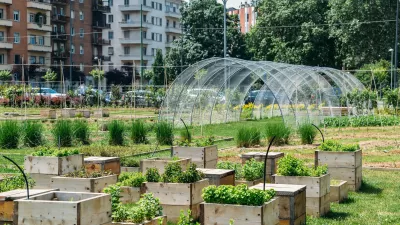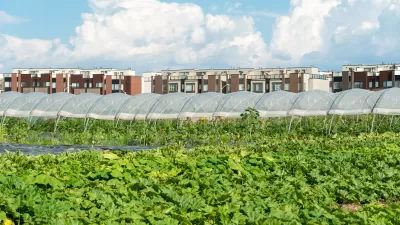With growing populations demanding more food and growing borders requiring more land, cities are one of the primary challenges to feeding the world's hunger problem. Can they also be the solution?
Summarizing issues raised at the recent “Feeding Cities” conference at the University of Pennsylvania’s Institute for Urban Research, Neal Peirce looks at the quandaries and opportunities raised by the relationship between food and cities.
"Cities themselves set up the problem," he explains. "They’re growing, both in population and the land they consume, at amazing speed, devouring often-fertile farmlands on their periphery. The population’s food demands are requiring a dramatic expansion of farmed territory. Drawn by the hope of better incomes, youth are moving to the cities, leaving agriculture to large-scale, intensive, corporate-driven farming systems and food distribution channels."
"On top of all those trends, Heather Grady of the Rockefeller Foundation noted in a keynote address, there is climate change, triggering either extreme heat or excessive rainfall and thus either drought or floods. One likely impact: price spikes, first hitting the poor who spend a large portion of their income on food."
However, by addressing two key areas - getting rid of waste in the processing, delivery and sales processes and conserving land for agriculture in, and around, urban environs - we can make significant progress towards being able to feed the 9 billion people who will inhabit the planet by 2050.
"To date, city-produced foods account for a tiny share of urban food needs," concludes Peirce. "But one is led to wonder: If city food demand is a top 21st-century concern, perhaps city ingenuity – and spirit – can also help to forge answers."
FULL STORY: Cities and Food: Quandary, Opportunity

Planetizen Federal Action Tracker
A weekly monitor of how Trump’s orders and actions are impacting planners and planning in America.

Restaurant Patios Were a Pandemic Win — Why Were They so Hard to Keep?
Social distancing requirements and changes in travel patterns prompted cities to pilot new uses for street and sidewalk space. Then it got complicated.

Map: Where Senate Republicans Want to Sell Your Public Lands
For public land advocates, the Senate Republicans’ proposal to sell millions of acres of public land in the West is “the biggest fight of their careers.”

Maui's Vacation Rental Debate Turns Ugly
Verbal attacks, misinformation campaigns and fistfights plague a high-stakes debate to convert thousands of vacation rentals into long-term housing.

San Francisco Suspends Traffic Calming Amidst Record Deaths
Citing “a challenging fiscal landscape,” the city will cease the program on the heels of 42 traffic deaths, including 24 pedestrians.

California Homeless Arrests, Citations Spike After Ruling
An investigation reveals that anti-homeless actions increased up to 500% after Grants Pass v. Johnson — even in cities claiming no policy change.
Urban Design for Planners 1: Software Tools
This six-course series explores essential urban design concepts using open source software and equips planners with the tools they need to participate fully in the urban design process.
Planning for Universal Design
Learn the tools for implementing Universal Design in planning regulations.
Heyer Gruel & Associates PA
JM Goldson LLC
Custer County Colorado
City of Camden Redevelopment Agency
City of Astoria
Transportation Research & Education Center (TREC) at Portland State University
Camden Redevelopment Agency
City of Claremont
Municipality of Princeton (NJ)





























